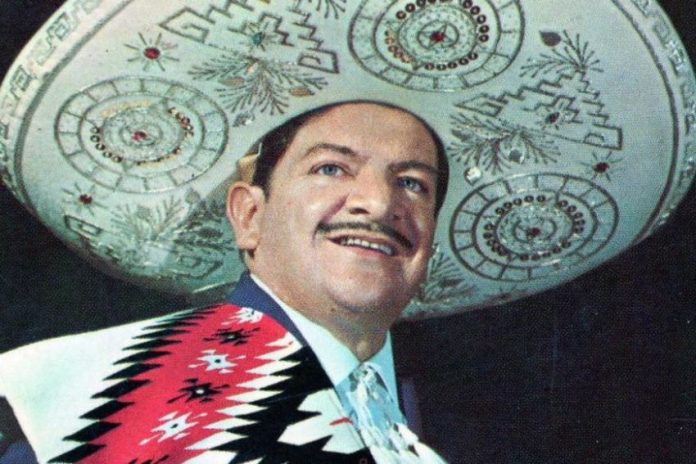Did you know that many songs you instantly associate with Mexico were written by just one man? José Alfredo Jiménez, one of the most prolific and cherished composers in Mexican history, is the mastermind behind countless ranchera and mariachi classics. Throughout his prolific career, he composed over 300 songs and appeared in several films.
Jiménez is known as “El Rey” (The King), for the title of one of his most iconic songs. This epic anthem has helped countless Mexicans rise back up with unapologetic pride when life has knocked them down. In “El Rey,” Jiménez boldly proclaims, “Con dinero y sin dinero hago siempre lo que quiero y mi palabra es la ley. No tengo trono ni reina ni nadie que me comprenda, pero sigo siendo el rey”: With or without money I always do what I want, and my word is the law. I have no throne or queen nor anyone who understands me, but I’m still the king.
The macho way of letting go
If you ever need help overcoming a failed romance, ask the mariachi to play “Te Solté la Rienda.” “Como al caballo blanco,” the first verse begins, “le solté la rienda, a ti también te suelto y te me vas ahorita.” The same way I dropped the white horse’s reins, I’m letting you go, and you should leave immediately.
Then goes on to say: “Y cuando al fin comprendas que el amor bonito lo tenías conmigo, vas a extrañar los besos… y has de querer mirarte en mis ojos tristes que quisiste tanto.” And when you finally understand that you had beautiful love with me, you’ll miss the kisses… and you’ll want to look into my sad eyes that you loved so much.
Dialing up the drama
In the guilt trippingly melodramatic “Pa’ Todo el Año,” he sings: “Si te cuentan que me vieron muy borracho, orgullosamente diles que es por ti / De hoy en adelante, ya el amor no me interesa. Cantaré por todo el mundo mi dolor y mi tristeza porque sé que de este golpe ya no voy a levantarme”: If they tell you they saw me very drunk, proudly say it’s because of you. From now on, I’m not interested in love / I will sing about my pain and sorrow all over the world because I will never recover from this blow.
The rise of the charro icon
Jiménez’s music is closely related to the events that surrounded his life. Born in 1926 in Dolores Hidalgo, Guanajuato, he grew up in a country working to rebuild its identity after the Revolution. The figure of the charro, a farmer wearing a wide-brimmed hat and fitted suit, became a key unifying symbol in postrevolutionary Mexico. Famously performing in charro garb, Jiménez played a major role in strengthening this figure as a national icon, representing bravery, self-reliance and pride for rural people.
José Alfredo’s own background, however, was far from rural. The house where he was born, now a museum, reveals that he came from an upper-middle-class family. His father was the first person to open a pharmacy in Dolores Hidalgo, but his death in 1936, shattered the family’s comfortable lifestyle.

After his father’s passing, at the age of 11, José Alfredo moved to Mexico City to live with his aunt and earn a living. There he began composing his first songs, whistling the melodies, as he never had any formal musical education. He dropped out of high school and formed a trio that played in bars for a few pesos.
Jiménez’s life took a significant turn in the late 1940s when an established musician discovered his talent. Within a few years, his voice was heard on the radio across the country, and he quickly became one of Mexico’s most celebrated singers and composers.
A monument to a legend at his final resting place
Jiménez was famously a heavy drinker, and the nightlife fueled his creativity. While drunk, he would grab whatever paper was nearby and start writing lyrics with remarkable ease. Unfortunately, years of alcohol abuse led to cirrhosis of the liver, and in 1973, he passed away in a Mexico City hospital at the age of 47. Despite his early death, his music continues to resonate across generations five decades later.
You can visit his final resting place in the municipal cemetery of Dolores Hidalgo. His tomb is an artistic masterpiece, featuring a colorful charro hat and sarape mosaic. At the base is inscribed, “Life is worthless. It always begins with tears and ends with tears. There, just beyond the hill, you can see Dolores Hidalgo. I’ll stay there, countryman, there’s my beloved town.”

His mausoleum is the only one in the cemetery facing west, a tribute to his song “La media vuelta,” where he sings: “Si encuentras un amor que te comprenda y sientes que te quiere más que nadie, entonces yo daré la media vuelta y me iré con el sol, cuando muera la tarde”: If you find a love that understands you, and you feel they love you more than anyone, then I’ll turn around and leave with the sun when the evening dies.
The legacy of José Alfredo Jiménez is a national treasure. His songs give voice to our emotions and the pride that holds us together. For many Mexicans, his music is a favorite form of therapy. He provides a safe space for us to feel our feelings and know that we’re not alone. In a very real sense, José Alfredo Jiménez understands us all.
Sandra Gancz Kahan is a Mexican writer and translator based in San Miguel de Allende who specializes in mental health and humanitarian aid. She believes in the power of language to foster compassion and understanding across cultures. She can be reached at: sandragancz@gmail.com
